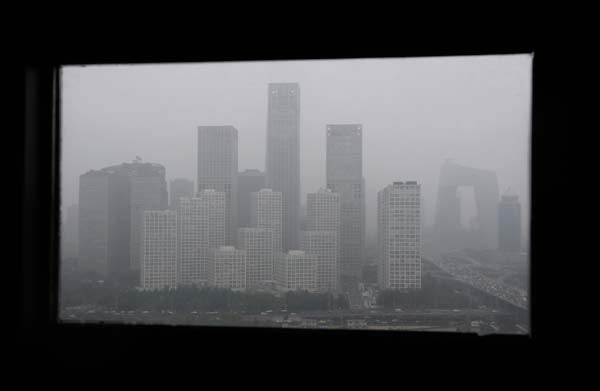Coal burning in China's north can shorten lives
Updated: 2013-07-10 02:37
By WANG QIAN (China Daily)
|
|||||||||||
|
 |
|
Buildings loom out of the haze in this view from a window in Beijing's Central Business District on Tuesday. Air pollution is shortening the lives of people in northern China by about 5.5 years, an international study shows. Jason Lee / Reuters |
Research shows people in polluted areas live an average of 5.5 years less
Heavy air pollution reduces life expectancy, a new study has found, ringing an alarm for policymakers looking to create their future energy roadmap.
The research published in the Proceedings of the National Academy of Sciences, a US multidisciplinary scientific serial, said on Tuesday that air pollution from burning coal caused people in northern China to live an average of 5.5 years less than the people living in the south. Coal burning has been providing heat to the north for decades.
"The study gives a clear answer to the link between life expectancy and air pollution," Li Hongbin, an economics professor at Tsinghua University School of Economics and Management in Beijing who collaborated with researchers in China, the US and Israel on the study, told China Daily on Tuesday.
The study analyzed the total suspended particulate matter and deaths in 90 cities across China from 1981 to 2000, finding a sharp difference in mortality rates on either side of the Huai River, which is the border giving people living north of the line free heating in winter.
"With the heating policy, the northern areas have been exposed to more pollution than the southern areas, which makes the study possible," Li said, adding that low rates of migration during this period were also key to the study.
Air pollution in the north from burning coal was 55 percent higher than in the south between 1981 and 2000, while life expectancies were 5.5 years lower on average across all age ranges.
The researchers said the differences in life expectancies were due mainly to increased deaths caused by diseases related to air quality, such as heart disease, stroke, lung cancer and respiratory illnesses.
Their analysis estimated that every additional 100 milligrams of total suspended particulate matter per cubic meter in the atmosphere lowers life expectancy at birth by about three years.
Total suspended particulate matter includes large particles and PM 2.5 — particles with diameters less than 2.5 micrometers — which are of great health concern because they can penetrate deep into the lungs. However, the researchers lacked the data to analyze those tiny particles separately.
"The real situation might be worse than the study showed, because PM 2.5 can be more harmful to health," Li added.
Gan Quan, senior project officer of the International Union Against Tuberculosis and Lung Disease, said the study was necessary in helping authorities be aware of the impact of air pollution and to adjust policies.
"We need such research to give a clear link between air pollution and life expectancy," Gan said.
Li agreed, adding that the study wasn't meant as a comment on the coal-heating policy, but to let the results show that the Chinese government should make of an effort to fight air pollution.
Related Stories
China strengthens air pollution control 2013-06-17 16:21
China shows resolve, action against air pollution 2013-06-15 17:14
China determined to fight air pollution 2013-06-15 16:56
10 steps taken to curb air pollution 2013-06-15 07:47
Tough measures introduced to curb air pollution 2013-06-14 23:21
Today's Top News
Snowden has not accepted asylum in Venezuela: WikiLeaks
QFIIs hope for expansion of program
Shenzhen Red Cross denies organ claim
Egypt names prime minister
Security in cyberspace 'still major problem'
Teenage girls were best friends
Headwinds may buffet growth
Coal burning in China's north can shorten lives
Hot Topics
Lunar probe , China growth forecasts, Emission rules get tougher, China seen through 'colored lens', International board,
Editor's Picks

|

|

|

|

|

|





